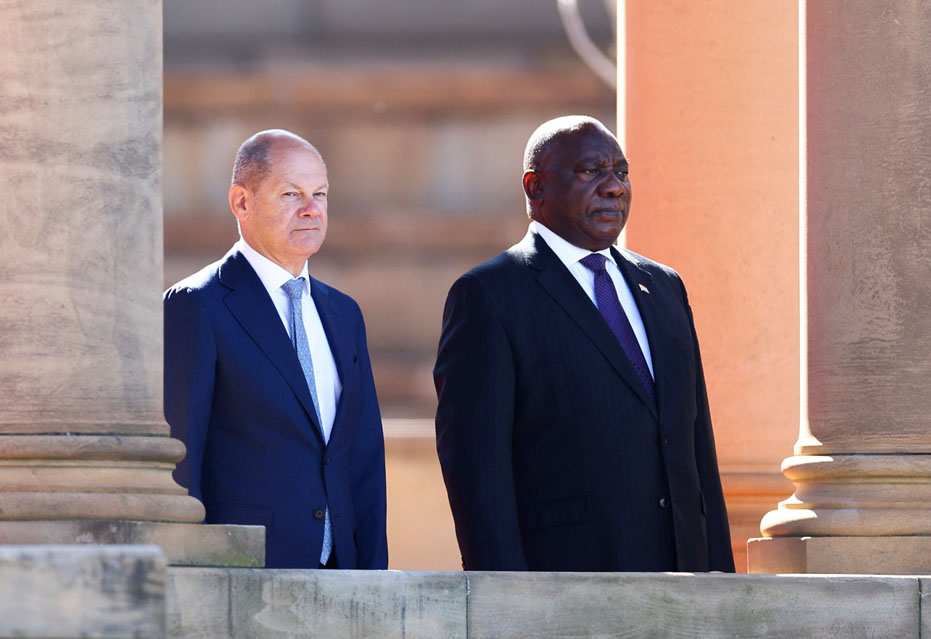
Ramaphosa Nods as German Chancellor Says Russia’s ‘Brutal War’ on Ukraine Must Stop ASAP
Russia’s ‘brutal war’ on Ukraine must stop as soon as possible, Germany’s Chancellor Olaf Scholz said today – Tuesday 24 May – during his official visit to South Africa. With host, President Cyril Ramaphosa, besides him, the German leader said he looked forward to discussions with SA’s President about some of the huge issues facing […]

Russia’s ‘brutal war’ on Ukraine must stop as soon as possible, Germany’s Chancellor Olaf Scholz said today – Tuesday 24 May – during his official visit to South Africa.
With host, President Cyril Ramaphosa, besides him, the German leader said he looked forward to discussions with SA’s President about some of the huge issues facing the world, from the pandemic to the climate crisis, and added: “And obviously one of the questions that is of big concern to us is the war that Russia imposed on Ukraine, the brutal war. We have to say it like this. It is necessary for peace in the world that this war stops as soon as possible (at this point Ramaphosa turned and nodded) and that there is a chance to defend the integrity and sovereignty of Ukraine.”
South Africa – as a BRICS country and with close historical ties to Moscow (who supported anti-apartheid campaigners) – has famously and for many, frustratingly, been one of the few countries in the world to try to remain neutral, abstaining from voting on a UN resolution against Russia’s invasion, calling for negotiations between the countries and refusing to condemn Russia or support sanctions against President Putin’s country. The SA government has also avoided calling it a Russian war, and rather used muted terms such as ‘Ukraine crisis’.
The German chancellor’s words this morning hinted that this is an issue he would like to tackle further with Ramaphosa, and perhaps convince the country to take an official stand in support of Ukraine.
Chancellor Scholz said: “We have to convince Russia that they will go out of the war and peace has a chance for Ukraine and the development of all of us.”
Ramaphosa seems unlikely to change his stance though. He reiterated SA’s position on the war, telling the press conference: “Engagement, dialogue and negotiation. I don’t see any other way other than negotiation and dialogue.”
Germany, and other Ukraine allies, believe the war is an unprovoked act of aggression by Russia, while Russia claims it is undertaking a “special military operation” to weaken Ukraine’s military capabilities, and capture dangerous nationalists.
The German Chancellor said he can’t accept that some countries voted in favour of Russia and against sanctions. “There are some countries that have voted on the side of Russia. That I cannot accept and it is unacceptable,” said Scholz.
He pointed out that Russia’s goal is to conquer Ukrainian territory, and said that ending Russian coal imports by Autumn is possible because of other suppliers, such as South Africa.

Earlier this month DA Leader John Steenhuisen made a trip to Ukraine to see the situation for himself, and to convey a message to leaders there that the SA government did not represent the views and feelings of many South Africans.
At the joint press conference in Tshwane, the German Chancellor said he is “very happy” that President Ramaphosa will be visiting Germany for the G7 meeting, saying “this is a great honour for me and it is something that is desperately needed because we will have to work on multilateral work, world and doing so, it is necessary that we cooperate and that we understand that there are things that we have in common, important for what we are doing.”
Ramaphosa said: “As Germany and as South Africa, we know too well the difficulties and challenges of reconstruction. Yet we know that with enduring partnerships such as ours, these challenges can be overcome and the many opportunities for progress can be embraced.”
This year marks 26 years since President Nelson Mandela’s state visit to Germany in 1996, and the establishment of the Bi-National Commission between the two countries.
With regards the pandemic, Germany has rendered extensive support to Africa’s efforts to combat COVID-19.
“Germany was the first country to respond to calls from the ACT-A Facilitation Council, which I co-chair with Prime Minister Støre of Norway, for countries to contribute their fair share towards ending the pandemic,” said Ramaphosa.
He also welcomed Germany’s announcement at the second Global COVID-19 Summit, earlier this month, that it will donate 850 million euros to assist poorer countries to increase their vaccination rates, and 50 million euros to the pandemic preparedness fund.
“We believe that vaccines destined for Africa should be produced in Africa. We look forward to engagement on this matter and on our proposal to the World Trade Organization for a temporary waiver of the TRIPS agreement,” said the SA president.
“We look forward to discussions on how we can work with Germany to advance our efforts towards industrialisation, infrastructure development and job creation,” and added: “We look forward to deepening trade and investment ties with Germany.”
Germany is South Africa’s second largest trading partner, a major investor in SA’s economy, and provides a significant market for inbound tourism.
The leaders’ discussions include the pursuit of peace and security on the African continent. This afternoon they will visit the Sasol plant.
WATCH Chancellor Scholz discuss Ukraine from 16′:
Media Briefing #GermanyInSA #BetterAfricaBetterWorld https://t.co/IOR56jdN1x
— Cyril Ramaphosa 🇿🇦 (@CyrilRamaphosa) May 24, 2022
Media Briefing #GermanyInSA #BetterAfricaBetterWorld https://t.co/IOR56jdN1x
— Cyril Ramaphosa 🇿🇦 (@CyrilRamaphosa) May 24, 2022
